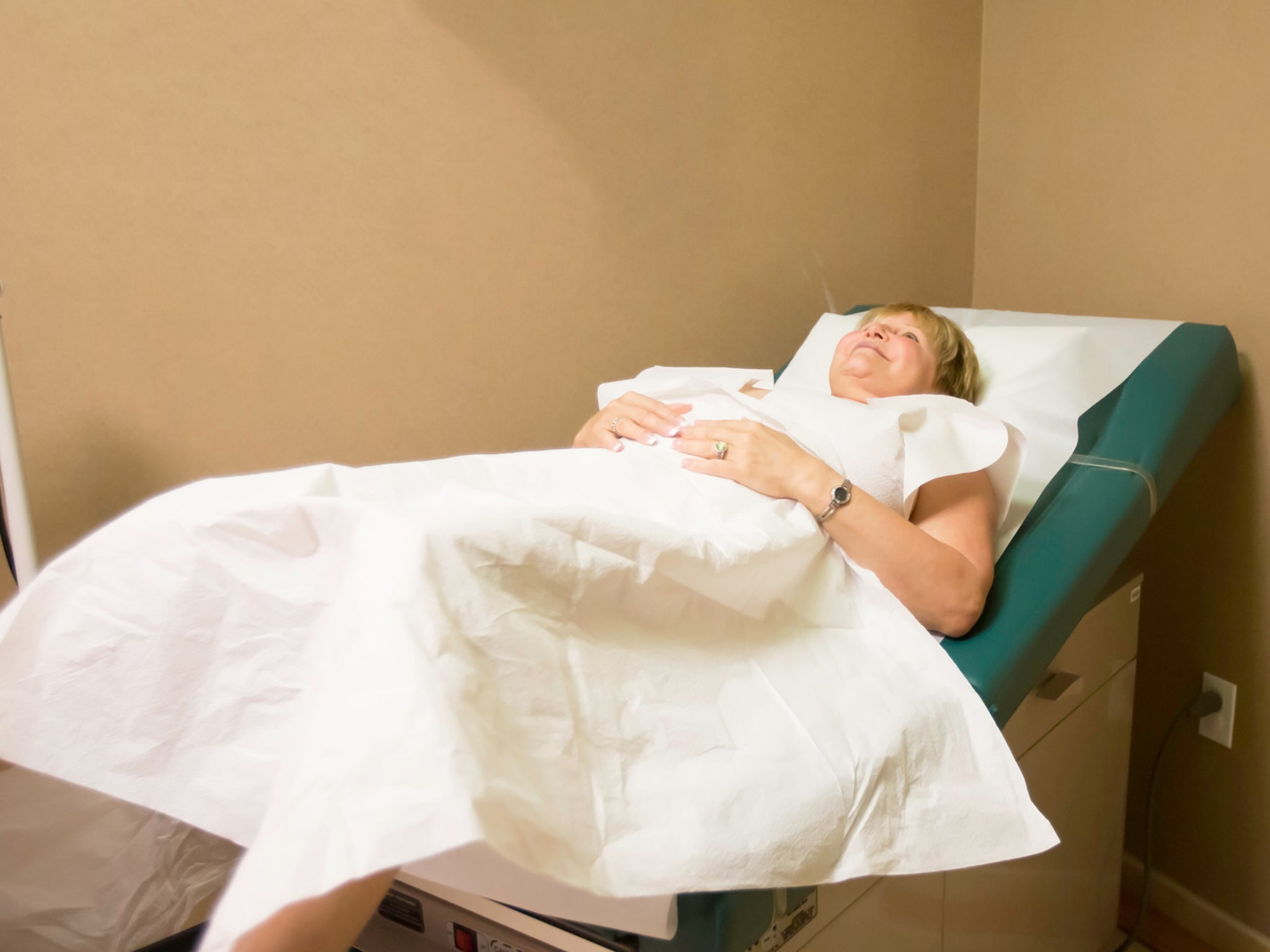‘Some days things just do not work’: What happens when your smear test doesn’t go smoothly?
Smear tests are often described as being quick and simple, but this means that the many people who struggle with them are left feeling embarrassed or, at worst, ‘problematic’ for doctors. Kate Townshend asks whether we need to change our approach


Your support helps us to tell the story
From reproductive rights to climate change to Big Tech, The Independent is on the ground when the story is developing. Whether it's investigating the financials of Elon Musk's pro-Trump PAC or producing our latest documentary, 'The A Word', which shines a light on the American women fighting for reproductive rights, we know how important it is to parse out the facts from the messaging.
At such a critical moment in US history, we need reporters on the ground. Your donation allows us to keep sending journalists to speak to both sides of the story.
The Independent is trusted by Americans across the entire political spectrum. And unlike many other quality news outlets, we choose not to lock Americans out of our reporting and analysis with paywalls. We believe quality journalism should be available to everyone, paid for by those who can afford it.
Your support makes all the difference.I am not someone who has to be encouraged to go for regular smear tests. I wouldn’t say I’m exactly enthusiastic about the procedure – I hardly count down the days – but I’m grateful to be able to have it, and grateful especially for the peace of mind it provides. Particularly after a scare with abnormal cells a few years ago. But at my last smear test, I spent 20 minutes gritting my teeth and blinking away tears of pain as the nurse tried again and again to find my cervix. Eventually, she had to give up and rebook my appointment. My wonky uterus has made things tricky before – apparently a tilted cervix can be harder to find – but this was the first time I’d had a smear test that proved basically impossible to complete.
In the name of demystifying the process and reducing anxiety around smear tests, we’re bombarded with the message that they are quick and simple. And they are, for many women and other people with cervixes. But I’ve since started wondering if, actually, we might need more awareness for the minority of people – like me – for whom turning up to our scheduled appointment is only half the battle.
Disabled journalist Cathy Reay is another woman with a tilted uterus. She also suffers from vaginal prolapse, meaning smear tests are at best deeply uncomfortable and at worst not possible at all. “Typically, one smear test for me needs three attempts by several different healthcare workers before they manage to successfully complete it,” she explains. “There’s a bit of embarrassment and shame around having internal organs and parts that don’t look and perform as they should.”
This is particularly acute when the prevailing narrative is that smear tests are no big deal – a narrative that even well-meaning medical professionals can perpetuate, as Reay has found. “I’ve heard dismissive and inappropriate things, almost jokingly, such as ‘Ah, so you’re the problem patient,’ she says. “This can be so jarring when you’re going through something this vulnerable and sensitive.”
But while it can feel isolating and stigmatising to be the person for whom smear tests are tough, I suspect – anecdotally, at least – that more of us are “problem patients” than we might think. Helen Hyndman is a nurse service coordinator at the Eve Appeal – one of the UK’s leading gynaecological cancer charities. She’s keen to point out that a whole host of medical conditions and life circumstances can make smear tests more complex. “Everything from conditions like endometriosis or vaginisimus [where the muscles of the vagina tighten up when the speculum is put in] to the aftermath of sexual abuse, or even the menopause and vaginal dryness, can have an impact,” she says. “It’s not actually that unusual at all for things to not be straightforward.”
Certainly this has been the case for Scotland-based Taylor Mulholland, who has polycystic ovary syndrome. She wonders if some residual trauma from her history of invasive tests in her teens might in part explain why her own smear tests have been difficult. “My first standard smear test was unsuccessful,” she says. “It was rescheduled and redone with a smaller speculum, which worked, but only just. [And] if your first test isn’t that standard 10-minute appointment you’re led to expect, it can feel really daunting. It was incredibly painful too.”
There does need to be more information to stop women feeling bad if it can’t be done
The other issue is that you can start to feel as if you’ve failed when the expectation of a “quick and easy” appointment proves anything but. When Taylor talks of “judging” herself after appointments like these, I’m reminded of all the times I’ve wondered if I should relax more, or put up with more pain, in the name of getting things done. Maybe there’s something in the word “test” itself that reinforces these feelings?
But Dr Fionnuala Barton, GP and menopause doctor at The Menopause Medic, is keen to remind women that smear test complications are not some moral failing on their part. “Remember the ‘failure’ is not with the person having the smear in any way,” she says. “Some days things just do not work.” Hyndman agrees: “It can feel embarrassing, and it’s not always a natural position to be in, but it’s nothing that you’re doing wrong.”
So other than remembering it’s not actually our fault, what else can we do when smear tests prove tricky? “Consider asking for a double appointment if you are worried things will take longer and you don’t want to feel rushed,” says Dr Barton. She also suggests taking a friend or family member along for moral support, and pre-informing the practitioner of any previous difficulties – particularly when rebooking tests. “And if speculum examinations for cervical smears are repeatedly difficult, then you can ask to be referred to local gynaecology services,” she says.
Hyndman points out that there are lots of adjustments that can be made during the smear test itself. “Speculums come in lots of sizes,” she says. “You can ask for a smaller one, or to look at it first, if that helps reduce any anxiety. You can do breathing exercises, or try different positions, which can be particularly useful with a tilted cervix. If your vagina is dry, you can ask for an oestrogen pessary to make things less painful. You can even listen to a podcast or music on your phone. And if you’re really dreading it, ask for an appointment to talk things through and make a plan before the main appointment. This is about you and what’s best for you, and it isn’t one-size-fits-all.”
Of course, to be able to access these adjustments, women and others with cervixes need to understand that they’re available in the first place – a catch-22 that Reay understands all too well. “It wasn’t until I started sharing my experiences that I realised it was really inappropriate that I’m never offered stirrups to steady my legs and keep them in position through the test,” she says. “I’ve had to go to sexual health clinics and hospitals for smear tests, because my local GP office can’t complete the test successfully. But despite smear tests being historically very difficult for me, I’m always expected to go to my GP first.”

Mulholland shares these concerns about a lack of information around options. “There’s zero awareness of what happens when you don’t fit the standard smear test expectation,” she says. “I got very lucky because I had a good gynaecologist. When my next routine smear test appointment came around, she suggested it was done under sedation at the same time as I was having a coil fitted. But I only found out it was a possibility because of her.”
Hyndman also acknowledges there is more work to be done when it comes to making women aware of their options. “There does need to be more information to stop women feeling bad if it can’t be done, or like they have to put up with it being painful,” she says. “We want you to have your smear test because it prevents cervical cancer, but we also want to give the right knowledge and support so that it works for you.”
For my own part, a rebooked appointment with a specialist doctor, and a change of speculum, enabled me to have a successful test. But not knowing about my options meant I endured an anxiety-inducing few weeks between those two dates. And while I understand the importance of normalising smear tests to encourage attendance, perhaps we also need to normalise the expectations around them. For me, the scary thing is not a difficult smear test, but the idea that I’m some sort of medical anomaly. There is power – and comfort – in realising I’m not alone after all.



Join our commenting forum
Join thought-provoking conversations, follow other Independent readers and see their replies
Comments